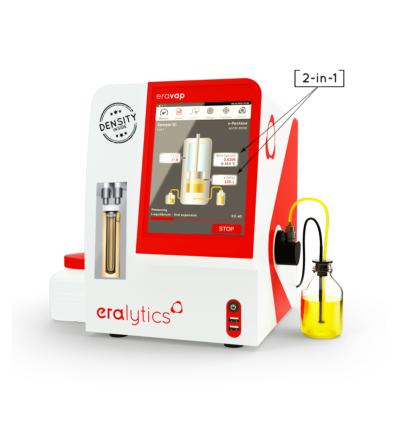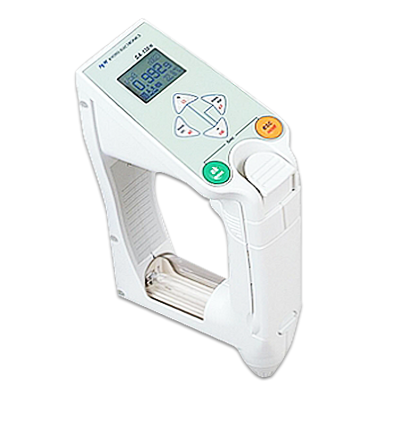ASTM D7777-18e1
Standard Test Method for Density, Relative Density, and API Gravity of Liquids by Portable Digital Density Meter.
ASTM D7777 covers the determination of density, relative density and API Gravity of petroleum distillates and viscous oils that can be handled in a normal fashion as liquids at the temperature of test, utilizing a portable digital density meters at test temperatures between 0 °C and 40 °C (32 °F to 104 °F). This method is to be used with samples with a dry vapor pressure equivalent up to 80 kPa (11.6 psi) and a viscosity below 100 mm2 /s (cSt) at the test temperature.
“The Density Module ES10 – D7777 is a convenient accessory of Eralytics, designed for all the product line to determine density, relative density and API gravity in full compliance to ASTM D7777 standard test method. Based on a state-of-the-art patent pending U-tube with a precision of 1.0 kg/m3 for easy conversion of weight to volume units and to refer volumes to the standard referee temperatures.
The Density Meter DA-130N from Kyoto Electronics Manufacturing KEM, is a fast, portable instrument capable of measuring density in less than 20 s with a minimal sample of 1.0 mL, designed for all the product line to determine density, relative density and API gravity in full compliance to ASTM D7777 standard test method. Based on a state-of-the-art temperature-controlled U-tube with a Temperature Compensation Coefficient and an estimated precision of 0.001 g/cm3, which will aid the user to expand the scope of fuel and petroleum products quality control.
The whole product line of KEM density meters and Eralytics modules correlate with all density standard test methods ASTM D1298, D1475, D4052, D5002, D5931, and ISO standards 12185 and 15212”.This portable test method is an alternative field method with many advantages to typical field tests, it is easily calibrated and does not pose the hazard of hydrometer glass breakage, being faster and more accurate”.
Referenced Standards
ASTM Standards:
D287 Standard Test Method for API Gravity of Crude Petroleum and Petroleum Products (Hydrometer Method)
D1193 Specification for Reagent Water
D1250 Guide for Use of Petroleum Measurement Tables
D1298 Standard Test Method for Density, Relative Density or API Gravity of Crude Petroleum and Liquid Petroleum Products by Hydrometer Method
D4052 Standard Test Method for Density, Relative Density and API Gravity of Liquids by Digital Density Meter
D4057 Practice for Manual Sampling of Petroleum and Petroleum Products
D4177 Practice for Automatic Sampling of Petroleum and Petroleum Products
D6822 Standard Test Method for Density, Relative Density and API Gravity of Crude Petroleum and Liquid Petroleum Products by Thermohydrometer Method
Energy Institute Standards:
IP 475 Petroleum Liquids – Manual Sampling
ASTM Adjuncts:
Adjunct to D1250-04 Temperature and Pressure Volume Correction Factors for Generalized Crude Oils, Refined Products, and Lubricating Oils
Summary of Test Method
A volume of liquid sample is introduced into an oscillating U-tube and the change in oscillating frequency caused by the change in the mass of the U-tube is used in conjunction with calibration data to determine the density, relative density, or API Gravity of the sample. For bench top stand-alone instruments and portable units, a volume of 1-2 mL of a liquid sample is introduced manually by means of a syringe or automatically by a controlled pump into a tight temperature-controlled oscillating U-tube.
Significance and Use
Density is a fundamental physical property that can be used in conjunction with other properties to characterize both the light and heavy fractions of petroleum and petroleum products. In this case for Eralytics D7777 is used in conjunction with instrument like Eravap that determines vapor pressure of Petroleum and Petroleum Products and in conjunction with Eraspec that determines physical and chemical properties of fuels by MID-IR absorption Spectrometry.
Determination of the density or relative density of petroleum and its products by either the built-in modules or the dedicated density meters shown in the Apparatus section is necessary for the conversion of measured volumes to weights and to volumes at the standard temperature of 15 °C.
Apparatus
A built-in digital analyzer consisting of a U-shaped, oscillating tube, and a system for electronic excitation, frequency counting, and display. The analyzer shall accommodate the accurate measurement of the sample temperature during measurement or shall control and keep the sample temperature constant to 15 °C. The instrument shall be capable of meeting the precision requirements described in this test method.
Portable Digital Density Meter—Capable, once calibrated, of determining density with an accuracy of ±1 kg ⁄m3, fitted with a temperature sensing device capable of measuring temperatures to ±0.5 °C, a pump mechanism for filling and emptying the U-tube and a digital display of the results. Some density meters have in-built software for calculating the density at 15 °C from the observed density at test temperature. Some density meters have a mechanism for adjusting the meter during calibration; for others, this adjustment is carried out using the in-built software.

The weight of sample will vibrate in the oscillating U-tube and the measured oscillating period is specific to a substance in proportion to its mass of weight. By this means and since the volume is constant it is possible to determine the density of a substance by measuring the oscillating period.
Ayalytical Instruments Inc., offers a series of instruments combined with other analyzers or stand-alone capable of determining density, relative density and API gravity of fuels and petroleum products in full compliance to D4052 and other standard methods.

Density Module built-in in Eravap Analyzer

Density Module built-in in Eraspec Analyzer
ES10-D7777 r= 0.0001 g/cm3
The Eralytics DENS-D7777 density module is combined with the vapor pressure analyzer Eravap and with the FT-IR fuel analyzer Eraspec for the determination of fuel quality parameters and fuel composition.
Available for gasoline methods fully compliant to D7777 standard test method although designed for 8th Generation instruments, upgrade is possible in most of the cases.
The portable KEM DA -130N series determines density in less than 20 seconds with an accuracy of up to 0.001 g/cm3.

Portable DA-130N KEM Density/Specific Gravity Meters
Reagents and Materials
Water conforming specifications D1193, Type III. Cleaning solvent reagent grade like Heptane or 40-60 Petroleum spirit are suitable for cleaning the U-tube. Propan-2-ol for general cleaning purpose and a Certified Reference Material for density calibration and validation are the reagents needed for the test.
Calibration and Adjustment
The verification of the instrument with the CRM can be performed periodically at least every 12 months. It is necessary to check the whole instrument for cleanliness and dryness. Section 9 of D7777 and manufacturer’s operating instructions are to be strictly followed before analyzing samples.
Procedure
The injection of the sample is automated and occurs according to the Eralytic’s model and instructions and or the KEM Operation Manual and model. Automated or Manual Syringe Injection in all product lines takes precaution for sample integrity and bubbles absence as described in D7777 Section 10.
Light weight Portable density meters suction and drain the sample with a thumb and a forefinger. Once the pressure is stopped the inlet operation will stop. Measurement can easily be obtained with the thumb pressing the “Measurement” button.
Follow manufacturer’s instructions for ensuring the integrity of the test specimen prior to analysis, as well as transferring a representative test specimen into the instrument for analysis.
Report
In reporting density, state the test temperature and the units generally at 20 °C to the nearest 0.001 g⁄cm3 or 1 kg⁄m3). When reporting relative density, state both the test temperature and the reference temperature, but no units,for example: relative density, 15 °C /15 °C to the nearest 0.001 or as API gravity to the nearest 0.1 API gravity.
Report the final result referencing the standard test method, identification and description of the sample, date of test and any deviation observed from the test method.
Precision and Bias
The precision of the method applies to samples boiling above 0°C and vapor pressures between 3.5 and 81 kPa, as obtained by statistical examination of interlaboratory test results at a test temperature of 15 °C is as follows for the following sample types and ranges described in Table 1:
Repeatability—The difference between successive test results obtained by the same operator with the same apparatus under constant operating conditions on identical test material, would in the long run, in the normal and correct operation of the test method, exceed the following value only in one case in twenty:
r = 0.006081 x (1000 – x)
where:
x = average of the values being compared (kg/m3).
Reproducibility—The difference between two single and independent results, obtained by different operators working in different laboratories on identical test material, would in the long run, in the normal and correct operation of the test method, exceed the following values only in one case in twenty:
R = 0.008545 x (1000 – x)
where:
x = average of the values being compared (in kg/m3)
Typical density values for the range 0.72 to 0.87 g/cm3 can be seen in Table 1 below:
Table 1 Density Precision values for D7777

Bias – No bias has been determined for this test method since a suitable accepted reference value material was included in the Energy Institute research report IP 559/2008.





